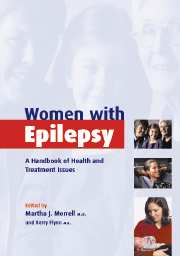Book contents
- Frontmatter
- Contents
- List of contributors
- Part I The woman with epilepsy
- Part II Epilepsy diagnosis and treatment
- Part III Hormones and the brain
- Part IV Health challenges for women with epilepsy
- Part V Family planning, pregnancy, and parenting
- 18 Family planning and contraceptive choice
- 19 Pregnancy risks for the woman with epilepsy
- 20 Risks of birth defects in children born to mothers with epilepsy
- 21 Neurocognitive outcome in children of mothers with epilepsy
- 22 Parenting for women with epilepsy
- Part VI Living well with epilepsy
- Appendix: The Epilepsy Foundation's Campaign for Women's Health: bringing help and hope to women with epilepsy
- Index
- References
21 - Neurocognitive outcome in children of mothers with epilepsy
from Part V - Family planning, pregnancy, and parenting
Published online by Cambridge University Press: 02 November 2009
- Frontmatter
- Contents
- List of contributors
- Part I The woman with epilepsy
- Part II Epilepsy diagnosis and treatment
- Part III Hormones and the brain
- Part IV Health challenges for women with epilepsy
- Part V Family planning, pregnancy, and parenting
- 18 Family planning and contraceptive choice
- 19 Pregnancy risks for the woman with epilepsy
- 20 Risks of birth defects in children born to mothers with epilepsy
- 21 Neurocognitive outcome in children of mothers with epilepsy
- 22 Parenting for women with epilepsy
- Part VI Living well with epilepsy
- Appendix: The Epilepsy Foundation's Campaign for Women's Health: bringing help and hope to women with epilepsy
- Index
- References
Summary
Most women with epilepsy must continue taking antiepileptic drugs throughout pregnancy. The risk to mother and baby of seizures outweighs the small risk associated with exposure of the baby to antiepileptic drugs. Although health-care providers have some information about the risks of birth defects from exposure to antiepileptic drugs, we have far less information about the possible effect of these medications on the baby's and child's later intellectual and emotional development. In fact, there have been no good studies within the USA following children whose mothers took antiepileptic drugs while pregnant.
Dr Kimford Meador is a Professor of Neurology at Georgetown University Hospital and Chair, Department and an expert on the intellectual and emotional effects of antiepileptic drugs. He has recently received funding to perform a landmark study to follow babies whose mothers receive antiepileptic drugs while pregnant. The babies will be followed for years and the investigators will gather information on intellectual achievements, emotional functioning, and neurologic development.
In this chapter, Dr Meador reviews what we now know about the neurological and cognitive effects of antiepileptic drugs on the developing fetus.
MJMThe great majority of children born to mothers with epilepsy have normal intelligence. However, the children of mothers with epilepsy are at a slightly higher risk for a disturbance in the development of the nervous system that can cause lower intelligence, learning difficulties, and behavior problems. This is referred to as impaired neurodevelopment.
Keywords
- Type
- Chapter
- Information
- Women with EpilepsyA Handbook of Health and Treatment Issues, pp. 222 - 227Publisher: Cambridge University PressPrint publication year: 2003

